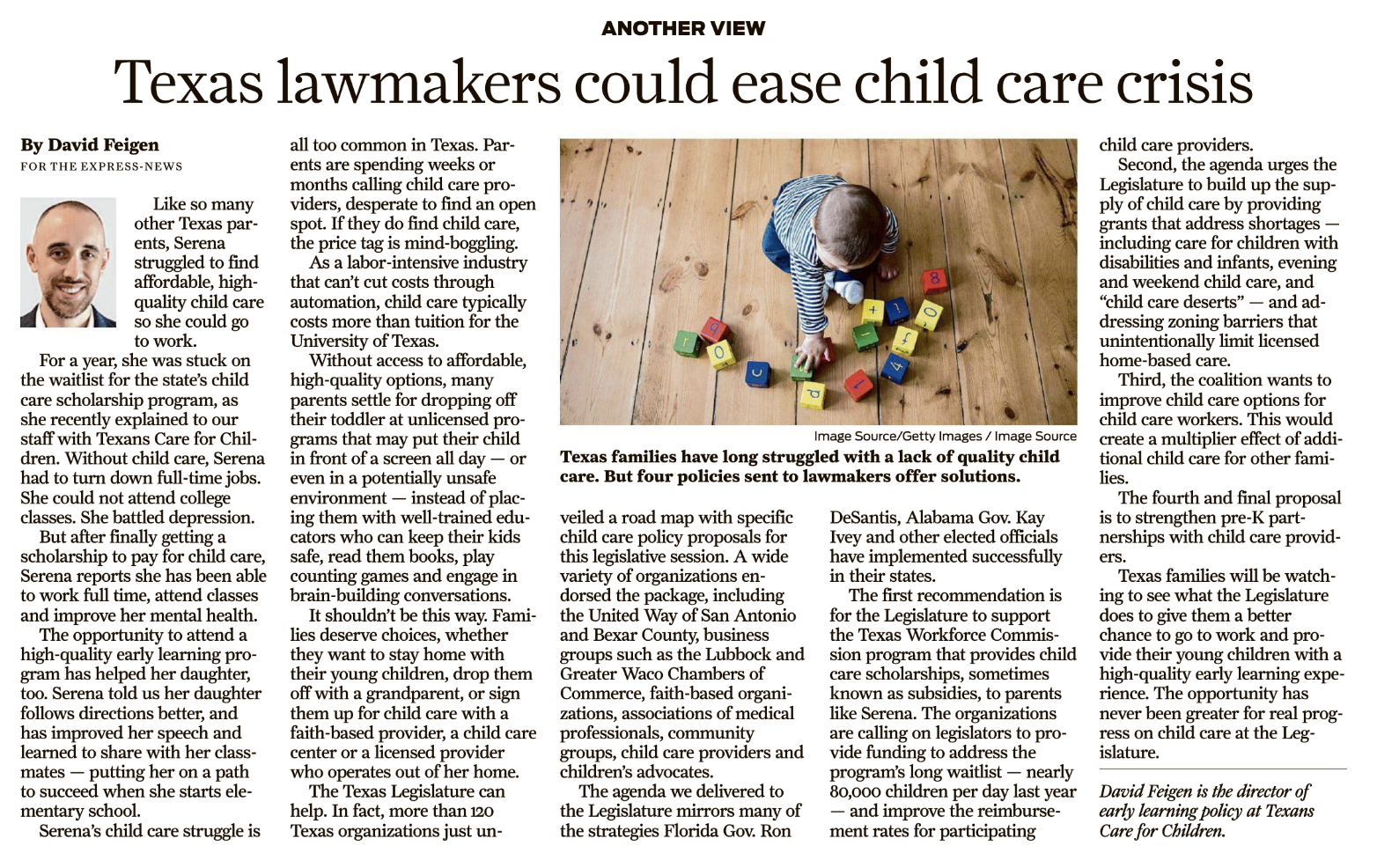
This commentary originally appeared in the San Antonio Express-News.
Like so many other Texas parents, Serena struggled to find affordable, high-quality child care so she could go to work.
For a year, she was stuck on the waitlist for the state’s child care scholarship program, as she recently explained to our staff with Texans Care for Children. Without child care, Serena had to turn down full-time jobs. She could not attend college classes. She battled depression.
But after finally getting a scholarship to pay for child care, Serena reports she has been able to work full time, attend classes and improve her mental health.
The opportunity to attend a high-quality early learning program has helped her daughter, too. Serena told us her daughter follows directions better, and has improved her speech and learned to share with her classmates — putting her on a path to succeed when she starts elementary school.
Serena’s child care struggle is all too common in Texas. Parents are spending weeks or months calling child care providers, desperate to find an open spot. If they do find child care, the price tag is mind-boggling.
As a labor-intensive industry that can’t cut costs through automation, child care typically costs more than tuition for the University of Texas.
Without access to affordable, high-quality options, many parents settle for dropping off their toddler at unlicensed programs that may put their child in front of a screen all day — or even in a potentially unsafe environment — instead of placing them with well-trained educators who can keep their kids safe, read them books, play counting games and engage in brain-building conversations.
It shouldn’t be this way. Families deserve choices, whether they want to stay home with their young children, drop them off with a grandparent, or sign them up for child care with a faith-based provider, a child care center or a licensed provider who operates out of her home.
The Texas Legislature can help. In fact, more than 120 Texas organizations just unveiled a road map with specific child care policy proposals for this legislative session. A wide variety of organizations endorsed the package, including the United Way of San Antonio and Bexar County, business groups such as the Lubbock and Greater Waco Chambers of Commerce, faith-based organizations, associations of medical professionals, community groups, child care providers and children’s advocates.
The agenda we delivered to the Legislature mirrors many of the strategies Florida Gov. Ron DeSantis, Alabama Gov. Kay Ivey and other elected officials have implemented successfully in their states.
The first recommendation is for the Legislature to support the Texas Workforce Commission program that provides child care scholarships, sometimes known as subsidies, to parents like Serena. The organizations are calling on legislators to provide funding to address the program’s long waitlist — nearly 80,000 children per day last year — and improve the reimbursement rates for participating child care providers.
Second, the agenda urges the Legislature to build up the supply of child care by providing grants that address shortages — including care for children with disabilities and infants, evening and weekend child care, and “child care deserts” — and addressing zoning barriers that unintentionally limit licensed home-based care.
Third, the coalition wants to improve child care options for child care workers. This would create a multiplier effect of additional child care for other families.
The fourth and final proposal is to strengthen pre-K partnerships with child care providers.
Texas families will be watching to see what the Legislature does to give them a better chance to go to work and provide their young children with a high-quality early learning experience. The opportunity has never been greater for real progress on child care at the Legislature.
David Feigen is the director of early learning policy at Texans Care for Children.



